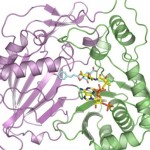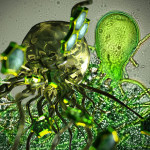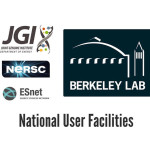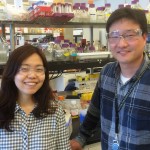Aymerick Eudes and Dominique Loqué of the Joint Bioenergy Institute (JBEI) led a study that shows for the first time that an enzyme can be tweaked to reduce lignin in plants. Their technique could help lower the cost of converting biomass into carbon-neutral fuels to power your car and other sustainably developed bio-products. The crystal structure of this enzyme was solved using data collected in the Berkeley Center for Structural Biology at the Advanced Light Source. Read more on the Berkeley Lab News Center.
DOE JGI User Facility Partnership Yields Gut Fungi Study
“Nature has engineered these fungi to have what seems to be the world’s largest repertoire of enzymes that break down biomass.”
Published online February 18, 2016, in Science, a team from UC Santa Barbara drew upon two U.S. Department of Energy Office of Science (SC) User Facilities: the Environmental Molecular Science Laboratory at Pacific Northwest National Laboratory and the DOE Joint Genome Institute to show that anaerobic fungi found in the guts of goats, horses and sheep are just as capable of breaking down plant biomass as are industry-developed fungi, potentially leading to cheaper biofuels and bio-based products. The team’s study is the first to result from a partnership between the two national user facilities called Facilities Integrating Collaborations for User Science or FICUS. The partnership allows scientists around the world to draw on capabilities at both SC user facilities to get a more complete understanding of fundamental scientific questions. Read more about the FICUS project on the JGI website.
Caribou Biosciences Receives Intellectual Property Rights for CRISPR Technology
In the latest round of intellectual property decisions from the US Patent & Trademark Office, Caribou Biosciences, co-founded by faculty scientist Jennifer Doudna, has been awarded intellectual property rights for CRISPR technology. The patent focuses on detecting areas in the genome that have been rearranged, versus genomic editing that would occur with the use of the associated Cas9 protein. CRISPR/Cas9 is a bacterial editing system that cuts and splices DNA sequences with unprecedented precision and speed and has become a technique used by scientists world-wide to study animal and plant cells. The patent dispute between the UC Regents and the Broad Institute was recently covered by the Los Angeles Times. More information about this recent decision can be found in The Daily Californian.
DOE JGI Debuts Animation about National User Facilities
Go team science! A new animation from the DOE JGI demonstrates how the DOE Joint Genome Institute, NERSC and Energy Sciences Network (ESnet) – all national user facilities at Berkeley Lab and supported by the U.S. Department of Energy Office of Science – work together, underpinning our critical research infrastructure to advance the frontiers of science, decode the Earth’s DNA, and improve our understanding of the world. Watch the video at bit.ly/UFvideoJGI on the DOE JGI Youtube channel.
JBEI Invention Leads to More Efficient Biofuel Production for Industrial Application
New Biosynthesis Pathways for Five-Carbon Alcohol from Mevalonate Are Available For Licensing
Researchers at the U.S. Department of Energy (DOE)’s Joint BioEnergy Institute (JBEI) have developed two novel biosynthesis pathways for five-carbon alcohol (isopentenol or 3-methyl-3-buten-1-ol) from mevalonate that reduce the energy demand and cost of earlier applications of the mevalonate pathway by using genetically engineered host cells, whose culturing stage can happen both in anaerobic or aerobic conditions. This invention can be used in an industrial scale, even under oxygen-limited conditions. These modified pathways would be a good platform for industrial production of isopentenol which is a potential gasoline alternative and a precursor of commodity chemicals such as isoprene. Read more on the JBEI website.
- « Previous Page
- 1
- …
- 195
- 196
- 197
- 198
- 199
- …
- 213
- Next Page »
Was this page useful?








